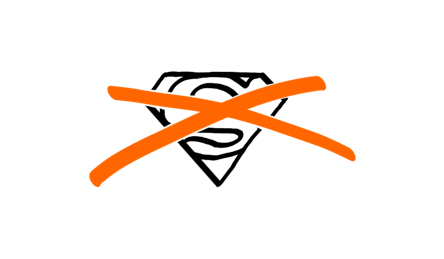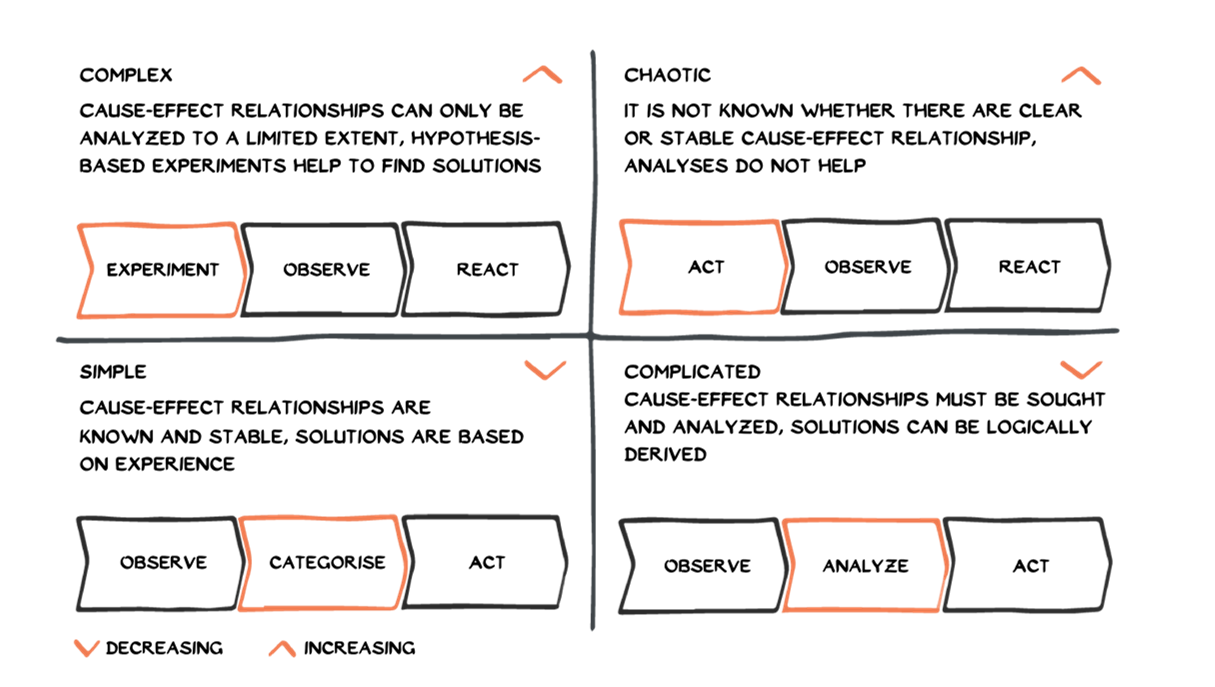

FORGET SUPERHEROES AND PAY ATTENTION TO THE RETURN ON EDUCATION
IN A WORLD CHARACTERIZED BY VUCA [1], MORE OF THE SAME IS NOT ENOUGH. COMPLEX AND CHAOTIC SYSTEMS WILL BE THE CHALLENGE OF THE FUTURE. AS A RESILT, ORGANIZATIONAL SKILLS WILL BECOME MORE IMPORTANT THAN READY-MADE OR PRECONCEIVED SOLUTIONS. THUS, ONE OF THE MOST IMPORTANT INDIVIDUAL SKILLS WILL BECOME KNOWING WHAT YOU DON'T KNOW. THIS IN TURN HAS FAR-REACHING IMPLICATIONS FOR PERSONNEL DEVELOPMENT AND STAFFING PROCESSES.
In the VUCA world with all its complexity and speed on the one hand and the loss of clear and stable cause-effect relationships on the other, more of the same will not be enough to maintain or even increase the usual level of success when dealing with challenges. The hypothesis is that experience- or analysis-based approaches to solving problems will continue to lose importance:

Figure 1: Four task categories and process models based on the Cynefin model
With the shift away from simple and complicated to complex and chaotic tasks, the approaches are also changing. There are no hard transitions, but the weightings in the portfolio of approaches are shifting.
Where, for example, simple tasks with a known and stable cause-effect relationship are concerned, the focus is on experience-based pattern recognition and tried and tested solutions. Incidentally, such tasks can be excellently automated or digitized, which means that they play an increasingly minor role in the everyday lives of employees.
If the topics become more complicated, the need for analytics increases in order to understand cause-effect relationships in detail, to work out alternative solutions and to evaluate them. Complicated issues can usually be solved well using methods such as Six Sigma.
If tasks become complex and systems increasingly unstable, a complete analysis can be too time-consuming and, above all, too slow. In this case, experiments come to the fore. Depending on the task, methods such as Design for Six Sigma or Design Thinking are suitable.
And last but not least, in the case of chaotic tasks, where it is not at all clear whether there are any clear or reasonably stable cause-effect relationships, there may not even be time for experiments. Often, only courageous action can help.
As I said, none of this is black and white, but the trend is clear and this has implications for the success factors in solving problems: Experience, knowledge and detailed planning are losing importance compared to the ability to deal with uncertainty, volatility and ambiguity. And this has far-reaching implications for employee development and staffing processes. After all, as requirements increase and become more sophisticated, it becomes more difficult to find people who are knowledgeable in all disciplines relevant to finding solutions. Quite apart from the fact that individual people are reaching the limits of their intellectual capacity, the different approaches to finding solutions also require different characters or mindsets. For example, those with a high need for security will struggle with experimentation, and impatient doers are certainly not the best candidates for extensive analysis phases.
So, what to do? The idea of relying on superheroes who know and can do everything is hardly feasible. Those who try will find themselves in a tough (and expensive) battle for talent and, moreover, dependent on “head monopolies”. And even if superheroes can be found and won over for the company, they quickly become a bottleneck resource: in demand everywhere and completely booked up.
The alternative is to spread knowledge more widely. Instead of investing in individual skills of a few, you increase the level. In other words, you increase the number of people who can contribute to solving challenges. And you rely on the fact that major challenges are best solved in teams.
Individual skills are still extremely valuable, but especially in combination with other skills. This means that, in addition to one's own knowledge and skills, the ability to collaborate across disciplines becomes more important, which in turn requires that people know what they don't know and are willing to solve tasks together with others. In particular, the latter must be considered when selecting employees and designing training concepts.
We can support you in this and in the design of processes for the composition of (project) teams. UMS training concepts make it possible to spread knowledge and skills widely thanks to the combination of method training and the practical application of what has been learned in everyday life. We empower people to apply proven methods, to collaborate, develop and implement systems to manage "return on education" and continuous learning. Contact us, we are looking forward to it!
[1] VUCA stands for Volatility, Uncertainty, Complexity und Ambiguity
More
Organisational capabilities
- Implement actions
- Build human capital
- Increase effectivity
- Manage change
- Manage complexity
- Increase agility
- Ensure sustainability
- Promote collaboration
Consulting Cases
Academy
- Lean Six Sigma Black Belt
- Lean Six Sigma Green Belt
- Lean Six Sigma Green Belt to Black Belt build-up training
- Six Sigma Yellow Belt
- Belbin Team Development
- Business Excellence for Executives
- Business Model Generation
- Change Canvas
- CIT Master
- CIT Practitioner
- Digitalization Excellence for Executives
- Understand customers
- Lean Six Sigma Master Black Belt
- Lean Transformation Belt
- Lego process facilitator
- Organizational Burnout
- Prozess Management Green Belt